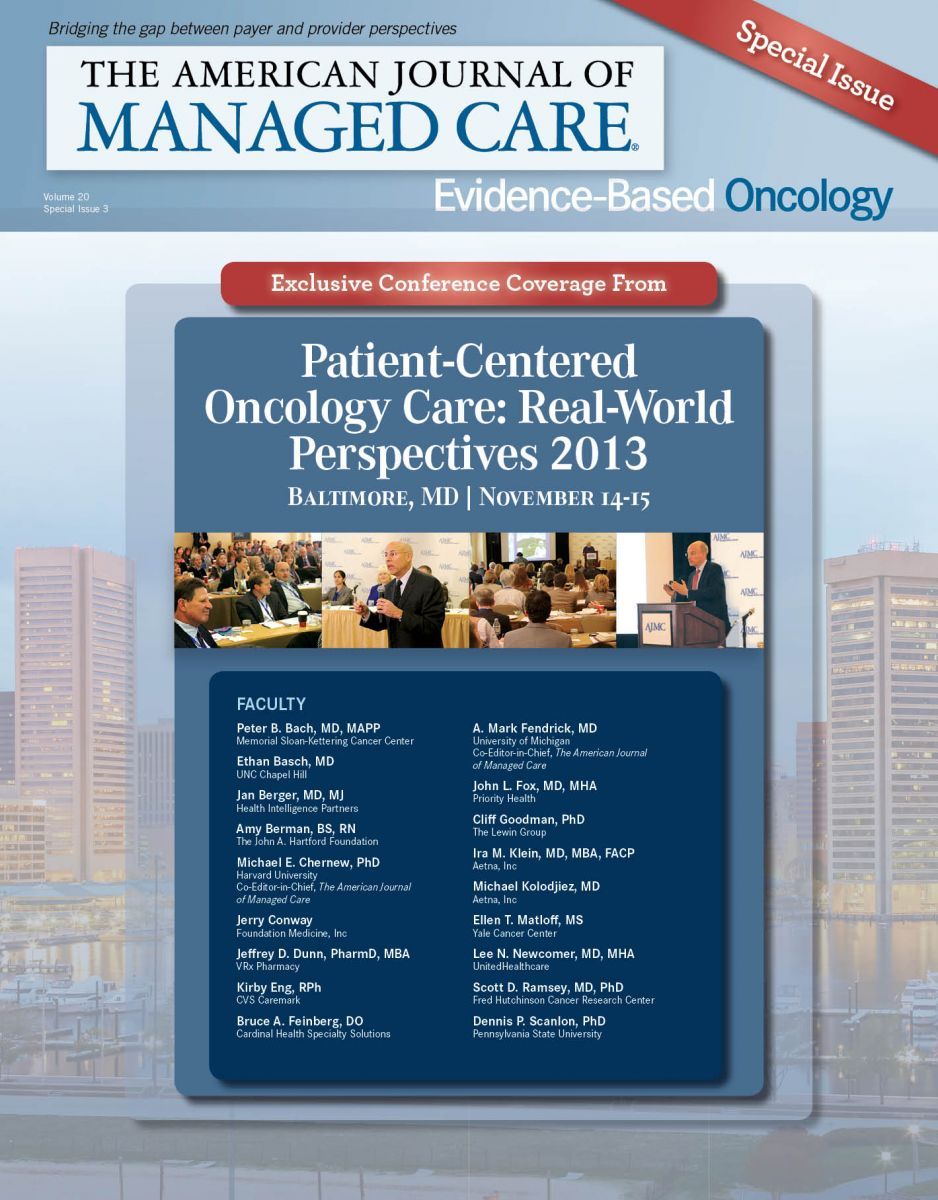- Center on Health Equity & Access
- Clinical
- Health Care Cost
- Health Care Delivery
- Insurance
- Policy
- Technology
- Value-Based Care
Next-Generation Sequencing in Oncology: Are We Ready for Prime Time?
A lively discussion on Foundation Medicine's approach to creating genomic profiles.
A lively discussion followed Jerry Conway’s presentation on Foundation Medicine’s approach to creating genomic profiles. The payer community, represented by Lee N. Newcomer, MD, MHA, of UnitedHealthcare, Michael A. Kolodziej, MD, of Aetna, Inc, and John L. Fox, MD, MHA, senior medical director and associate vice president, Priority Health, had plenty of questions. Ira M. Klein, MD, MBA, FACP, of Aetna, Inc, moderated.
With great power comes great responsibility. That edict applies in many settings, and now, too, in genomic sequencing as it stands to transform decision making in cancer care.
Ira M. Klein, MD, MBA, FACP, put that idea out front to trigger responses from the payers, who joined Jerry Conway of Foundation Medicine to gauge whether the advances Conway presented can deliver what they promise—and whether payers should foot the bill for data collection while the evidence rolls in.
Conway clarified that despite press reports of the cost of genomic sequencing coming down, the costs have actually flattened, due to charges from platform companies. Getting DNA ready for sequencing is difficult and costly. “Over time, yes, I think it will be more efficient,” Conway said. “Where the rubber meets the road is the enormous effort that’s required to make sense of the data coming off the sequencers.”
So, while the promise of next-generation sequencing is enormous, who should pay to build the knowledge base needed to help unlock the potential? Payers on the panel clearly worry that cost is headed their way.
Lee N. Newcomer, MD, MHA, of UnitedHealthcare, said too much is being made of single cases like the one Conway outlined in his earlier presentation. Providers don’t grasp the limitations, or the lack of evidence, and payers are put in a tight spot. “The need for clinical data and evidence is absolutely essential, and that’s what we want from your database, but in the meantime, you can’t expect the public to fund those data because the resources are too scarce,” Newcomer said.
“We’re not suggesting that you take 1 case study and that becomes policy,” Conway responded. “There’s a lot of work to be done.”
John L. Fox, MD, MHA, senior medical director and associate vice president, medical affairs, Priority Health, weighed in with his concern that predictions based on genetic sequencing may not be the same from tumor to tumor, and that it’s important to acknowledge what is not known. “When we have more and more information about what the mutations are, we have less and less information about whether or not patients are likely to respond,” he said. “The real challenge is what evidence do we need to inform the decision for payers, let alone patients and physicians, about when topull the trigger.”
Michael A. Kolodziej, MD, spoke of the “leadership vacuum” in policing the scientists who use genomic sequencing to decide what drugs to try. Payers should not bear all the burden of this research, he said, but it’s so fascinating that pressure will mount for payers to fund the studies. “This is something that has got to be dealt with, and it needs to be dealt with soon, because it is so sexy,” Kolodziej said.
Klein asked, given this vacuum, whether this was the right place for collaboration between payers and pharma.
Fox said that there are some clinical trials he does not mind funding, and payers know many of these costs are headed their way under the Affordable Care Act.
Newcomer followed: “What I’d love to see is the master US protocol on this concept.” If sequencing shows there is an actionable gene in an unproven cancer, then payers could pick up the clinical costs while pharmaceutical companies provided the drugs.
Conway said his company cannot bear such costs by itself, but could be part of a collaborative process to do so.
After all, Klein said, the goal is to match the right treatment with the right patient—first in a study setting, and then in a traditional one.
Newcomer, Kolodziej, and Fox all had thoughts on this point. “If I could have an ideal trial, it would be the first relapse randomized to either genomically directed or standard of care. Let’s see
whether the concept brings forth some kind of extra value,” Newcomer said.
Kolodziej and Fox wondered whether the genomic approach should be tried earlier in a cancer’s progression, not after all other options had been exhausted. Pressure is mounting from providers to do something different for those patients with a poor prognosis.
EBO
Said Fox, “There is going to come a point pretty quickly, I think, where the tension between these two is going to hit the public and explode.”

Quality of Life: The Pending Outcome in Idiopathic Pulmonary Fibrosis
February 6th 2026Because evidence gaps in idiopathic pulmonary fibrosis research hinder demonstration of antifibrotic therapies’ impact on patient quality of life (QOL), integrating validated health-related QOL measures into trials is urgently needed.
Read More
Building Trust: Public Priorities for Health Care AI Labeling
January 27th 2026A Michigan-based deliberative study found strong public support for patient-informed artificial intelligence (AI) labeling in health care, emphasizing transparency, privacy, equity, and safety to build trust.
Read More
Ambient AI Tool Adoption in US Hospitals and Associated Factors
January 27th 2026Nearly two-thirds of hospitals using Epic have adopted ambient artificial intelligence (AI), with higher uptake among larger, not-for-profit hospitals and those with higher workload and stronger financial performance.
Read More
Motivating and Enabling Factors Supporting Targeted Improvements to Hospital-SNF Transitions
January 26th 2026Skilled nursing facilities (SNFs) with a high volume of referred patients with Alzheimer disease and related dementias may work harder to manage care transitions with less availability of resources that enable high-quality handoffs.
Read More

